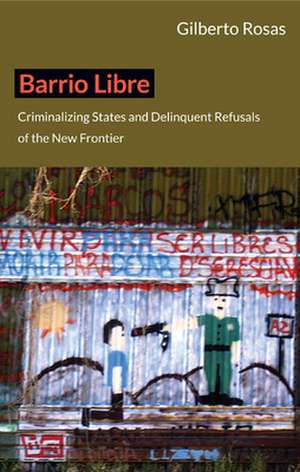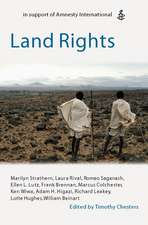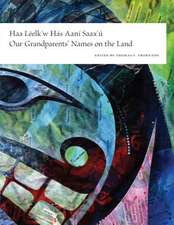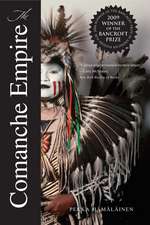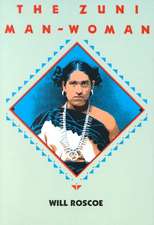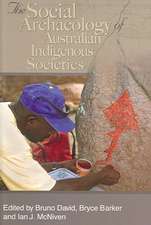Barrio Libre – Criminalizing States and Delinquent Refusals of the New Frontier
Autor Gilberto Rosasen Limba Engleză Paperback – 18 iun 2012
Preț: 228.50 lei
Nou
Puncte Express: 343
Preț estimativ în valută:
43.72€ • 47.69$ • 36.87£
43.72€ • 47.69$ • 36.87£
Carte tipărită la comandă
Livrare economică 24 aprilie-08 mai
Preluare comenzi: 021 569.72.76
Specificații
ISBN-13: 9780822352372
ISBN-10: 0822352370
Pagini: 200
Ilustrații: 5 illustrations
Dimensiuni: 194 x 233 x 13 mm
Greutate: 0.27 kg
Editura: MD – Duke University Press
ISBN-10: 0822352370
Pagini: 200
Ilustrații: 5 illustrations
Dimensiuni: 194 x 233 x 13 mm
Greutate: 0.27 kg
Editura: MD – Duke University Press
Recenzii
Gilberto Rosas offers a raw and compelling ethnography which grapples with the violence, racism, and determined attempts by border youth to build their own sense of freedom in the cage of the U.S.-Mexico border and its economy of ever-increasing inequalities. A significant contribution to the area of border studies and borderlands which enriches our understanding of the world of youth.Lynn Stephen, author of Transborder Lives: Indigenous Oaxacans in Mexico, California, and Oregon"Gilberto Rosass exploration of the seamy underbelly of neoliberal state sovereignty in the sewer tunnels beneath the US-Mexico border takes us to a vexed and murky place, both ethnographically and theoretically. His work invites us to consider provocative and urgent questions about the deep complicity between policing and criminality, and the racialized relegation of human life to abjection and unnatural death on the new frontier. Rosas's insistence upon directing our critical gaze to a dark and dank place of subjection, power, and violence ought to instigate vital new lines of debate in the study of border enforcement and subjectivity within the wild zones of state power."Nicholas De Genova, co-editor of The Deportation Regime: Sovereignty, Space, and the Freedom of Movement
"Gilberto Rosas offers a raw and compelling ethnography which grapples with the violence, racism, and determined attempts by border youth to build their own sense of freedom in the cage of the U.S.-Mexico border and its economy of ever-increasing inequalities. A significant contribution to the area of border studies and borderlands which enriches our understanding of the world of youth." - Lynn Stephen, author of Transborder Lives: Indigenous Oaxacans in Mexico, California, and Oregon "Gilberto Rosas's exploration of the seamy underbelly of neoliberal state sovereignty in the sewer tunnels beneath the US-Mexico border takes us to a vexed and murky place, both ethnographically and theoretically. His work invites us to consider provocative and urgent questions about the deep complicity between policing and criminality, and the racialized relegation of human life to abjection and unnatural death on the new frontier. Rosas's insistence upon directing our critical gaze to a dark and dank place of subjection, power, and violence ought to instigate vital new lines of debate in the study of border enforcement and subjectivity within the wild zones of state power." - Nicholas De Genova, co-editor of The Deportation Regime: Sovereignty, Space, and the Freedom of Movement
"Gilberto Rosas offers a raw and compelling ethnography which grapples with the violence, racism, and determined attempts by border youth to build their own sense of freedom in the cage of the U.S.-Mexico border and its economy of ever-increasing inequalities. A significant contribution to the area of border studies and borderlands which enriches our understanding of the world of youth." - Lynn Stephen, author of Transborder Lives: Indigenous Oaxacans in Mexico, California, and Oregon "Gilberto Rosas's exploration of the seamy underbelly of neoliberal state sovereignty in the sewer tunnels beneath the US-Mexico border takes us to a vexed and murky place, both ethnographically and theoretically. His work invites us to consider provocative and urgent questions about the deep complicity between policing and criminality, and the racialized relegation of human life to abjection and unnatural death on the new frontier. Rosas's insistence upon directing our critical gaze to a dark and dank place of subjection, power, and violence ought to instigate vital new lines of debate in the study of border enforcement and subjectivity within the wild zones of state power." - Nicholas De Genova, co-editor of The Deportation Regime: Sovereignty, Space, and the Freedom of Movement
Notă biografică
Cuprins
Acknowledgments ix
Introduction. The Criminalizing Depths of State and Other Shit 3
1. Other Nightmares and the Rise of the New Frontier 29
2. Against Mexico: Thickening Delinquency of the New Frontier 55
3. Low-Intensity Reinforcements: Cholos, Chúntaros, and the "Criminal" Abandonments of the New Frontier 73
Interlude. Post-September 11 at the New Frontier 89
4. Against the United States: The Violent Inaugurations and Delinquent Exceptions of the New Frontier 95
5. Oozing Barrio Libre and the Pathological Ends of Life 115
Interlude. Nervous Cocks at the New Frontier 133
Conclusion. The New Frontier Thickens 137
Notes 147
Bibliography 163
Index 183
Introduction. The Criminalizing Depths of State and Other Shit 3
1. Other Nightmares and the Rise of the New Frontier 29
2. Against Mexico: Thickening Delinquency of the New Frontier 55
3. Low-Intensity Reinforcements: Cholos, Chúntaros, and the "Criminal" Abandonments of the New Frontier 73
Interlude. Post-September 11 at the New Frontier 89
4. Against the United States: The Violent Inaugurations and Delinquent Exceptions of the New Frontier 95
5. Oozing Barrio Libre and the Pathological Ends of Life 115
Interlude. Nervous Cocks at the New Frontier 133
Conclusion. The New Frontier Thickens 137
Notes 147
Bibliography 163
Index 183
Descriere
Rosas asserts the importance of capitalism and criminality in shaping of perceptions and realities of race, sovereignty, and resistance along the U.S./Mexico border.
